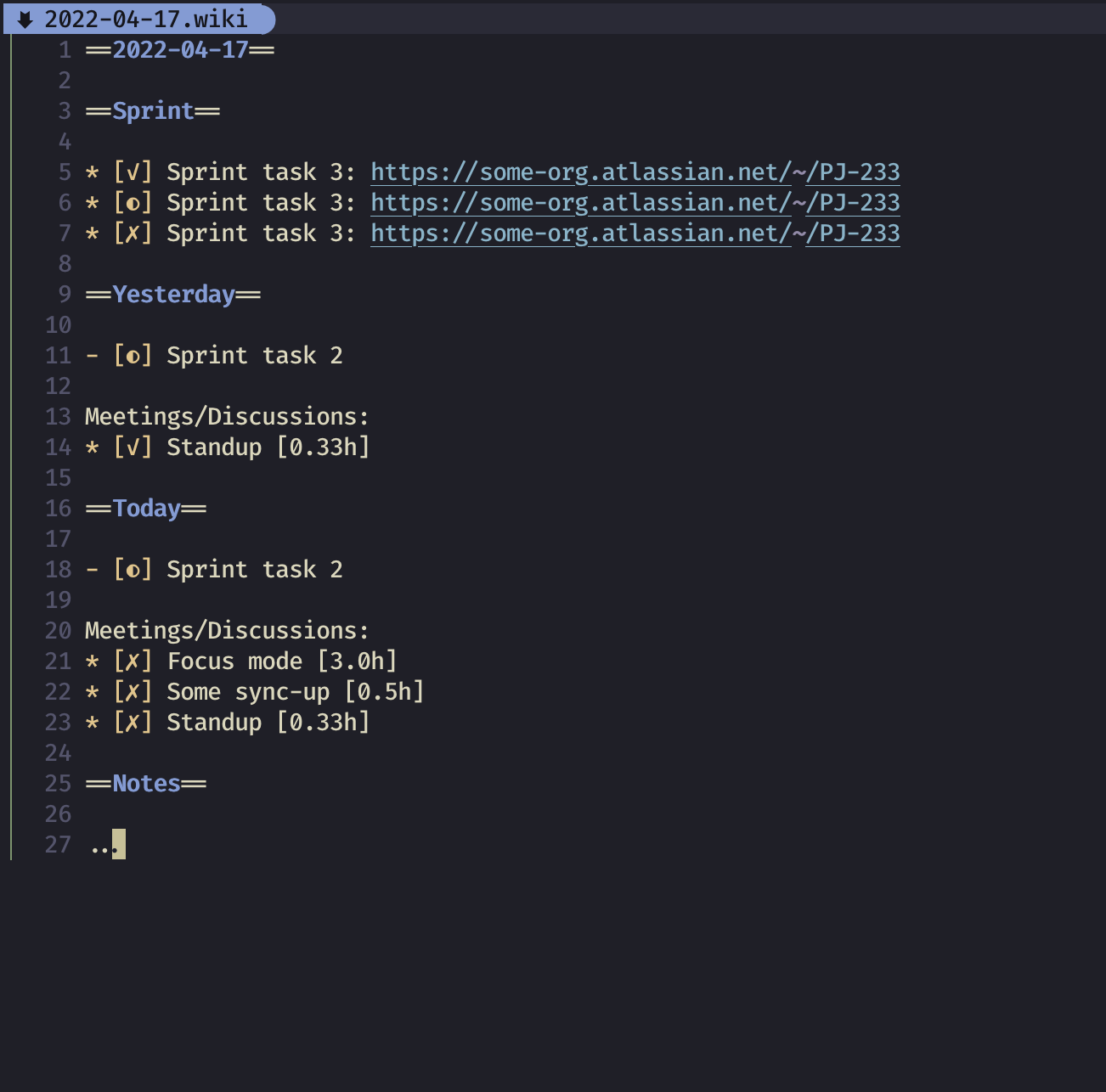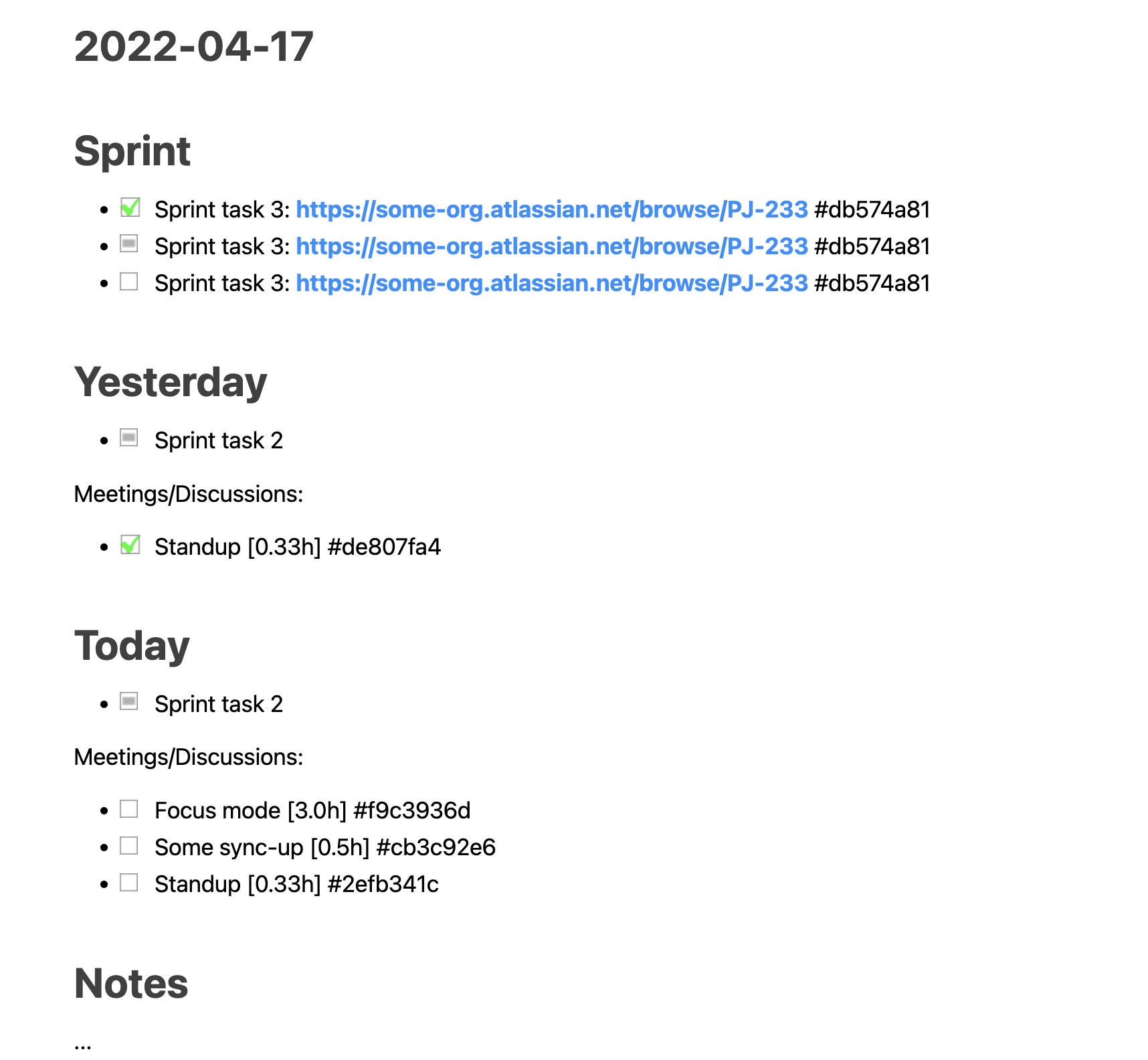Note taking
I have been following the same workflow for note taking for the past 3 years.
I wanted to have a system using which I can be consistent while being ok to take a trade-off of it not being the perfect one. I now have 750+ daily diary notes now which is roughly more than 95% of working days logged using the current system.
My idea of note-taking
The intention is to have a smooth note-taking workflow to organize my knowledgebase.
Daily note-taking
My basic requirement here is to make daily notes for work, discussions, fleeting notes, tasks in a way that is easy to access and edit.
Documents
A general repository of documents, an organized knowledgebase for my work / personal stuff, easily accessible with minimal tooling overhead.
The defunct workflow
Until 2019, I had no consistent way of taking and keeping track of notes from work or otherwise.
During this time, I had tried out the good ol’ pen and paper methods, maintaining a physical daily diary but the information accessibilty becomes difficult over time. I tried Mac OS’ default notes app for a few months but it felt it was good enough for small todo list tracking. To be honest, I might have also not followed a good approach of creating effective notes.

Image 1: My notes in the "Notes" app in Mac OS. Each day I used to create a new note and jot down everything dealing what that particular day (tasks, meetings etc.). This was my way of note-taking in 2018 to early 2019.
The present day
After trying some out-of-the-box solutions, I realized that I was missing the freedom to create my own customizations and automations on top of the tools I use.
I have now embedded my note taking workflow into my general working setup via my editor using Vimwiki.
As per Vimwiki’s documentation:
With VimWiki, you can:
- Organize notes and ideas
- Manage to-do lists
- Write documentation
- Maintain a diary
- Export everything to HTML
Daily note taking
This is the most useful part of my current setup. I have a “diary” wiki for
every day to keep track of current day’s work, meetings, thoughts etc. A few
keystrokes (<leader>w<leader>w) and I can just start writing.
I have a few automations in place for daily diary like auto populating a list of my work tickets from Jira (I can update their stasuses from my diary as well), list of meetings to attend, creating list of items for standup meeting etc.
For individual meetings and discussions, I keep quick notes in the diary and then move them around to appropriate places.

Image 2: This is a minimal view of an auto-generated diary wiki. I add all my daily notes and stuff on this. I disabled a few task tracking workflows to keep it minimal for demonstration purposes.
Documents
These are just normal wiki documents linked with each other if required but more importantly with vimwiki, I can cleanly organize, access and query the information.
Managing personal notes
I have a separate wiki for my personal notes. It’s like a replica of my work wiki setup with of course not so much of a powerful workflow and automation. It has it’s own diary and repository of documentation. This is to keep my work and other personal things isolated.
Vimwiki lets you achieve this really easily. 2<leader>ww and I am in my
personal wiki space.
Version control
All the notes and the documents which I mantain is version controlled in a git repo and I push them to a self-hosted git server (it’s just a small Linode instance with a git server installed).
I have enabled a cron to auto commit diary wikis and push to remote repo everyday at a specific time. For larger documents, it requires more thoughtful version control than blind auto commits for which I go by the conventional git workflow.
Things I’d want to improve
Sharing
Sharing docs and notes with others is difficult in this workflow, there’s not public view of the information. Therefore, I have to usually duplicate some information to a more publicly accessible location when I want to share.
Sometimes, it is meant to be this way (duplicating information). For example: quick meeting notes, drafts of some ideas etc. which eventually are supposed to have a refined public representation in the form of a public doc, email etc. However, if I have any detailed permanent doc which I want to share would need to be duplicated in its entirety and published somewhere more accessible.
Another drawback is the vimwiki markup syntax. I use vimwiki’s own syntax using which I can’t share the docs as other people might not be familiar with it. Although vimwiki supports markdown, I am fairly comfortable with the vimwiki’s markup syntax. If it becomes too much of a hindrance over time, I’ll consider moving completely to markdown.

Image 2: This is UI view of the diary wiki as displayed in image 1 previously. This is good for sharing it as a screenshare item or just for display purposes. You wouldn't share an html with people.
Cross-platform
My current workflow assumes having access to my work or personal machine. It’s currently difficult to create notes on the fly when I don’t have access to my machine. These are mostly fleeting notes while in a conversation with someone, some interesting thoughts while commmute etc.
I would want to improve it to atleast make it accessible via my phone. Technically, I can go to my remote repository and add things but that’s not very convenient.
Currently, I just use my phone’s default note-taking app and log which tbh is very convenient. It just requires some manual effort to sync it up with my organized system.
The irreplaceables?
There are instances where pen & paper is the way to go.
In 2016, during my job interviews, whenever I explained about my projects and work, I used to also draw and jot down the topics I was discussing in the call. Over the 10-15 minutes of discussion, I could clearly see the links among the pieces I am talking about, if it follows a logical flow and find any missing piece in the discussion.
Now in 2022, this is equally helpful for me being on the other side of the interview. I keep a notebook and try to create a map of people’s work. I try to create a basic block diagram of the projects people talk about based on their explanation and then do QnA on them to understand the hows, whys, any missing components and details which I couldn’t understand.
This is one instance where notebook is irreplaceable or atleast the one I would always prefer.
About task tracking
I have a task tracking system which is closely integrated with my daily diary note taking workflow. I will probably write a different blog post about it.
In short few words, I use Taskwarrior with Vimwiki to manage my tasks which are independent or grouped by projects, time tracking prioiritization etc. Vimwiki has a clean integration with Taskwarrior via Taskwiki.